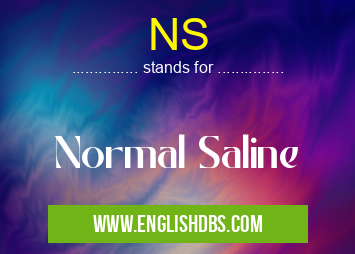What does NS mean in CLINICAL MEDICINE
Normal saline is an aqueous solution of sodium chloride, which is a salt that completely dissociates in water. It has been widely used in clinical settings for decades and is safe for patients of all ages. Normal saline (NS) is a versatile, relatively inexpensive solution that aids hydration, provides electrolytes, flushes wounds, and much more.

NS meaning in Clinical Medicine in Medical
NS mostly used in an acronym Clinical Medicine in Category Medical that means Normal Saline
Shorthand: NS,
Full Form: Normal Saline
For more information of "Normal Saline", see the section below.
Benefits
Normal saline has many benefits and uses due to its simple composition. It can be used as a vehicle solution for medications and treatments such as chemotherapy drugs, antibiotics, and other injectables. NS helps patients maintain their electrolyte balance by providing necessary electrolytes like sodium and chloride in the body while restoring fluid volume if lost from dehydration or bleeding. Normal saline can also be used to flush open wounds or assist with wound healing by helping to keep the wound free of infection or debris by washing away dead tissue and other impurities from the area. In addition, it can be used to reduce swelling caused by edema and has even been found to help reduce post-operative nausea.
Uses
Normal saline is commonly used intravenously in hospital settings to provide hydration and restore electrolyte balance when necessary. Furthermore, it can be administered through sterile wound dressing such as spray bottles or gauze pads to cleanse surgical sites or wounds affected by infection, as well as being added to eye drops to prevent inflammation around the eyes or treat dry eyes. It may also be used in conjunction with other medications like antibiotics for wound care or skin infections caused by bacteria such as Staphylococcus Aureus (MRSA). Lastly, normal saline may be administered through nasal sprays or inhaled through nebulizers to aid in respiratory treatments and illnesses such as bronchitis or congestion caused by viral infections like the common cold.
Essential Questions and Answers on Normal Saline in "MEDICAL»CLINICAL"
What is Normal Saline?
Normal Saline is a balanced salt solution made of sterile water and salt, designed to hydrate and replenish lost fluids. It typically consists of 0.9 percent sodium chloride in water and is commonly used for medical purposes, including intravenous solution and irrigation solutions.
How is Normal Saline used?
Normal Saline is often used for medical purposes, such as rehydrating patients or flushing wounds or tissue. It can also be used for therapeutic purposes, such as irrigating sinus cavities and cleaning contact lenses.
Who should use Normal Saline?
Normal saline may be recommended by a doctor or health professional depending on the medical situation of the patient. It's important to follow the directions provided by your doctor when using any over-the-counter medications or treatments.
What are the benefits of using Normal Saline?
The main benefit of using normal saline is that it helps prevent dehydration, as it can replenish lost body fluids quickly and safely without causing any disruption in natural body electrolyte balance. Additionally, normal saline can help relieve pain caused by inflammation or infections and promote healthy wound healing.
How long does it take for Normal Saline to work?
The effects of normal saline will vary depending on the individual and the specific application, but generally speaking its effects should be noticeable within a few minutes or hours after administration or topical application. Be sure to consult your doctor if you have any questions about how long it takes for normal saline to work.
Is Normal Saline painful to use?
No, normal saline should not be painful to use when administered properly under appropriate medical supervision. Pain may occur if there are some underlying conditions affecting the area being treated with normal saline; however, this can usually be addressed during consultation with a healthcare professional beforehand.
Are there any side effects associated with using Normal Saline?
Generally speaking, there are no known side effects associated with using normal saline; however, some people may experience mild reactions such as nausea or dizziness after intravenous administration due to their sensitivity towards the salt content in solution. Be sure to consult your doctor if you experience any unusual symptoms after taking it.
Is it safe for children to use Normal Saline?
Yes, it is safe for children to use normal saline when prescribed by their caregivers/healthcare professionals; however they should always seek advice from their pediatrician before administering it themselves at home in order ensure proper dosage and usage guidelines are followed correctly according to their condition/diagnosis (if applicable).
Final Words:
In conclusion, normal saline (NS) is a versatile solution composed of sodium chloride which has an array of medical uses including hydration therapy; restoring electrolyte balance; wound healing; preventing infection; reducing swelling; treating dry eyes; administering chemotherapy drugs; aiding respiratory treatments; and much more. As it is generally safe for all ages and relatively inexpensive compared to other solutions, normal saline should always be kept readily available in any medical setting where it could become useful!
NS also stands for: |
|
| All stands for NS |
